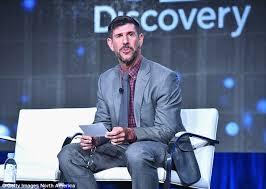Dear Rich Ross, new President of the Discovery Channel,
I was excited to learn about your commitment to no longer show fake documentaries on the Discovery Channel. These shows have been incredibly damaging not only to Discovery’s goals of being the “number one non-fiction media company in the world” by”telling compelling and accurate stories,” but to public understanding of science and conservation. In recent years, the Discovery Channel has tried hard to actively muddle the fact that these documentaries were fake, including hiding vague disclaimers at the very end. I’ve spoken to hundreds of schoolchildren about sharks, and every time someone asks me about megalodon or mermaids. Viewers believed that they were real, and your channel actively bragged about the fact that people believed that they were real.
By claiming that megalodon isn’t extinct and mermaids are real but the government is covering this up, these shows resulted in scientists receiving threats and harassment, and resulted in important government agencies getting so many angry phone calls that they had to issue public statements. Producers for some of these shows intentionally lied to scientists to convince them to appear onscreen, intentionally lied to journalists about the facts behind them, and intentionally caused a real-life public panic. They actually showed a documentary about a legendary (read as “fake”) shark called Hitler. In short, I will be glad to see Shark Week and the Discovery Channel return to your roots of fact-based programming.
However, while “we won’t actively lie to viewers anymore” is an important step that I applaud, Shark Week and other Discovery Communications programs have many other problems that should be addressed. Shark Week 2014’s “Zombie Sharks” glorified wildlife harassment for no reason, as the entire stated goal of the show was for a non-scientist with a history of wildlife harassment to try to answer a question that scientists have known the answer to for decades. This problem is not limited to Zombie Sharks, but pervades Discovery Communications shows.
Many, many Shark Week shows promote fear of sharks by focusing on the incredibly rare event of sharks biting people. These bites so rare that the same ones have been covered on multiple Shark Week documentaries! 1 in 4 species of sharks, skates and rays are listed as threatened with extinction on the IUCN Red List, and fearmongering media coverage such as that featured on Shark Week makes it harder to get public support for shark conservation.
Even some of the Shark Week documentaries that aren’t fake or based on fearmongering regularly share factually incorrect information, and the narration seems to lack even a cursory attempt at fact-checking. This problem is readily on display with Shark Week’s social media accounts, which claim to be sharing “Shark Facts.” Approximately half of them are completely incorrect. Just today, @SharkWeek claimed that the U.S.S. Indianapolis was sunk by a shark, for crying out loud! The Shark Week social media accounts reach hundreds of thousands of people, imagine the good they could do if the facts they shared were actually correct!
Fortunately, there are still lots of excellent programs featured on Shark Week, and these can be a great starting point for bringing Discovery back to the great educational network that helped inspire me and countless others to pursue careers in marine biology and conservation. The “Alien Sharks” series focuses on rarely seen species, unlike most of the rest of shark week which seems to focus only on great whites, bulls, and tigers. Shark researchers Greg Skomal and Michael Domeier have regularly been featured on Shark Week documentaries, and while I’d love to see more female researchers featured, these two always do a great job.
You’ve already made the commendable decision to no longer air fake documentaries, and with a few simple fixes you can easily address these other concerns. The success of BBC shows like “Planet Earth” has shown that there is a market for non-sensationalized natural history programming; focus your future programming on the amazing behaviors and biodiversity of sharks and on the incredible and diverse people who work hard to study and protect them!
There’s no need to focus on fearmongering, repetitive nonsense, or on “even though you watched for 2 hours they didn’t find the mythical shark because it doesn’t really exist” type shows. There’s no need to release dangerous snakes into a community pool so you can film your TV stars saving people from them, no need for people to try to feed themselves to giant snakes, and no need for wildlife harassment of any kind. Instead of featuring tweets that comment on how attractive the female scientist is on the bottom of the screen, maybe throw in pop-up text boxes with a science or conservation fact or two. Have an actual trained and credentialed expert on the biology and behavior of these animals fact-check your scripts and the social media posts.
In the past few years, Shark Week has burned a lot of bridges with the scientific and conservation community, but if you follow through on your commitments to improve the Discovery Channel and address the concerns I’ve outlined here, these relationships, and your reputation, can be rebuilt. I remain cautiously optimistic about the future of your channel, and I remain willing to help however I can.
Sincerely,
David Shiffman
“WhySharksMatter”
















